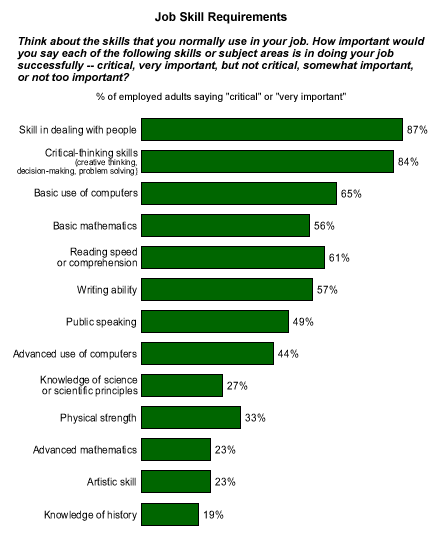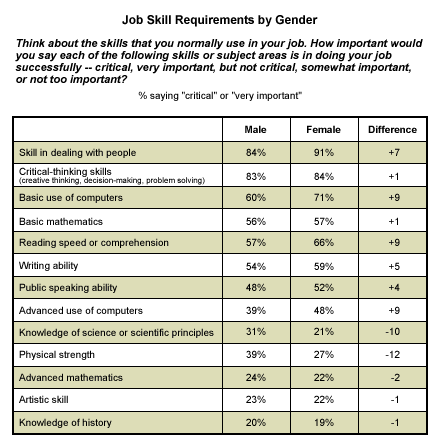First in a two-part series
The butcher, the baker, the candlestick maker. The doctor, the lawyer, the chief engineer. No matter our occupations, each of us needs skills or knowledge of specific subjects in order to do our jobs successfully. In a recent poll, Gallup asked employed adults how important various subject areas or skills are to their success at work.
Gallup gave respondents a list of 13 work-related skills and subject areas and asked them to rate each one as "critical," "very important," "somewhat important" or "not too important" to their ability to do their jobs successfully. Standing far above the rest are "skills in dealing with people" and "critical-thinking skills," each rated as "critical" to their job success by half of employed Americans (more than 8 in 10 employed adults say these are critical or very important).
While employee-training workshops, adult education classes, and university courses in these areas abound, they may be a bit more difficult to learn in a classroom setting. In fact, one of the reasons people skills and critical-thinking skills are prized so highly in the workplace is because they are not easily learned. As Gallup has documented in numerous studies, consistently outstanding performance in such areas as communication and analytical thinking require some degree of inherent talent.
Below the top two skills on the list are areas that are endemic to nearly every type of work -- basic computing (65%), reading speed or comprehension (61%), writing ability (57%), and basic math (56%). Less than half of employed Americans cite the importance of skills that are specific to more specialized fields, such as advanced mathematics, artistic skills, and physical strength.

Mars and Venus
While employed men and women basically agree on the relative value to their own jobs of most of the skills and subject areas listed, several areas are valued somewhat more highly by women than men. However, it should be noted that these ratings may reflect in part the nature of the respondents' jobs and as well as possible gender differences. For example, employed women assign greater importance to basic and advanced use of computers and reading speed and comprehension in their jobs than employed men do.
Deborah Tannen, author of several definitive books on the differences in interpersonal communication styles between men and women, writes in Talking from 9 to 5: Women and Men at Work, "Conversational rituals common among women are often ways of maintaining an appearance of equality, taking into account the effect of the exchange on the other person, and expending effort to downplay the speakers' authority so they can get the job done without flexing their muscles in an obvious way." This may explain, in part, why women deem reading and computer use more important -- they may view these abilities as essential communication tools with which to hone their people skills.
On the other hand, jobs requiring "scientific knowledge" or "physical strength" have traditionally been dominated by males, as reflected in the finding that fewer women than men say these are critical to success in their jobs.

Bottom Line
People value the skills that are the most broadly admired by employers. It's impossible to read the classified ads without coming across certain words and phrases over and over again. A recent New York Times classified ad is typical: "The ideal candidate will have the ability to communicate effectively, possess excellent business written and oral skills, have proficient PC skills. In addition, the candidate must be motivated, able to work independently, think creatively, and successfully interact with all levels of management and staff."
*Results are based on telephone interviews with 588 adults employed full or part time, aged 18 and older, conducted Aug. 4-6, 2003. For results based on the total sample of national adults, one can say with 95% confidence that the margin of sampling error is ±4 percentage points.